高中英语语法练习八:动词时态和语态
高考英语动词时态和语态专题练习
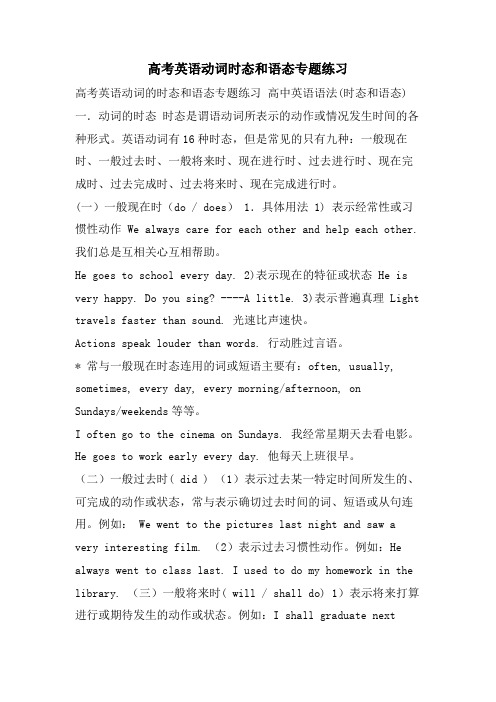
高考英语动词时态和语态专题练习高考英语动词的时态和语态专题练习高中英语语法(时态和语态) 一.动词的时态时态是谓语动词所表示的动作或情况发生时间的各种形式。
英语动词有16种时态,但是常见的只有九种:一般现在时、一般过去时、一般将来时、现在进行时、过去进行时、现在完成时、过去完成时、过去将来时、现在完成进行时。
(一)一般现在时(do / does) 1.具体用法 1) 表示经常性或习惯性动作 We always care for each other and help each other. 我们总是互相关心互相帮助。
He goes to school every day. 2)表示现在的特征或状态 He is very happy. Do you sing? ----A little. 3)表示普遍真理 Light travels faster than sound. 光速比声速快。
Actions speak louder than words. 行动胜过言语。
* 常与一般现在时态连用的词或短语主要有:often, usually, sometimes, every day, every morning/afternoon, onSundays/weekends等等。
I often go to the cinema on Sundays. 我经常星期天去看电影。
He goes to work early every day. 他每天上班很早。
(二)一般过去时( did ) (1)表示过去某一特定时间所发生的、可完成的动作或状态,常与表示确切过去时间的词、短语或从句连用。
例如: We went to the pictures last night and saw a very interesting film. (2)表示过去习惯性动作。
例如:He always went to class last. I used to do my homework in the library. (三)一般将来时( will / shall do) 1)表示将来打算进行或期待发生的动作或状态。
高考英语动词的时态和语态

专题九动词的时态和语态考点知识清单一、动词的时态高中英语教学大纲中要求掌握的只有八种:一般现在时,一般过去时,一般将来时,现在进行时,过去进行时,现在完成时,过去完成时,过去将来时。
另外现在完成进行时、过去完成进行时和将来完成时也比较常用。
二、动词的语态(一)语态的基本概念语态是动词的一种形式,用来说明主语和谓语动词之间的关系。
英语动词有两种语态,即主动语态和被动语态。
主动语态:表示主语是谓语动词动作的执行者。
被动语态:表示主语是谓语动词动作的承受者。
如:We respect our teachers.我们尊敬老师。
(主动语态)Our teachers are respected by us.老师受到我们的尊敬。
(被动语态)(二)被动语态的构成知识梳理考点一一般现在时1.表示经常发生的习惯性的、现在反复出现的动作或状态,这类句子常用的时间状语有:always(总是),usually(通常),seldom(很少),often(经常),sometimes(有时),every day(每天),now and then(时常),once a week(一周一次)等。
如:I usually go to bed at nine.我通常9点钟睡觉。
He writes to his parents once a month.他每月给父母写一封信。
2.表示眼下或目前等现在时间所发生的动作或存在的状态,这种状态带有一定的持续性。
如:They are very busy.他们很忙。
What’s the matter with you?你怎么了?3.表示客观事实或普遍真理。
如:China is in the east of Asia.中国位于亚洲东部。
Light travels faster than sound.光比声音传得快。
4.书报的标题,故事的叙述,小说、戏剧、电影等情节介绍,图片的说明等。
如:The story takes place on an island during the second Revolution Civil War.这个故事发生在第二次国内革命战争时期的一个海岛上。
高中英语语法——动词的时态与语态word版 附答案

动词的时态与语态动词的分类:实义动词(及物动词、不及物动词)、连系动词、情态动词、助动词。
动词的时态、语态的重难点及高考考点:有八种时态在高考中经常考到1、一般现在时;2、一般过去时;3、一般将来时;4、现在进行时;5、过去进行时;6、现在完成时;7、过去完成时;8、过去将来时。
而其中最易混淆的三组时态是1、一般过去时和现在完成时;2、一般过去时和过去完成时;3、现在完成时和过去完成时动词语态:动词语态包括主动语态和被动语态,而被动语态是学习和备考的难点。
动词的时态:英语中的谓语动词要根据使用的时间不同而发生变化。
一般一个动词具有四种变化形式:一般现在时的单数三人称形式(用于一般现在时且主语是单数三人称时),动词的过去式(用于一般过去时),动词的现在分词(用于进行时),动词的过去分词(用于完成式和被动语态),各种词形变化都有相应规则,需熟记。
一般现在时:一、概念:经常发生的动作或习惯性的行为。
二、常连用的时间副词:always,every time, now and then,occasionally,often,seldom,sometimes, usually, frequently, once in a while.三、句型结构:(以动词work为例)主动结构:S+work/works+O; S+can/must+work+O; S+am/is/are+P.被动结构:S+am/is/are+worked(+by+O).四、常考的考点:(一)、在时间、条件、方式、让步状语从句中代替将来时态。
Eg:1.The water (pollute )unless some measures (take).2.Even if she (not come )this weekend, I (go) fishing by myself.3.He (visit) his aunt the day he (come) to Beijing.(二)、表示现在时刻存在的状态,这种状态带有一定的持续性。
高中英语语法详解——动词的时态和语态(专项讲解及习题练习)

教师的教考点详解第一讲时态一.一般现在时(do/does; am/is/are)1.条件(1)表示经常发生的、习惯性的动作,I usually have my hair cut once a month.3. 否定形式:①am/is/are+not; ① don’t /doesn’t +动词原形+……4. 一般疑问句:①把be动词放于句首;① Do/Does +…+动词原形+…?二.一般过去时(did; was/were)1. 概念:过去某个时间里发生的动作或状态;过去习惯性、经常性的动作、行为。
(1)有些句子,虽然没有明确的表示过去的时间状语,但实际上指的是过去发生的动作或状态,也要用一般过去时。
常见的此类动词有know,think,expect 等,表示“本来认为”。
I didn't expect to meet you here.I thought he had heard the news.2. 时间状语:三.一般将来时(will do)一般将来时表示将来某个时间将要发生的动作或存在的状态,也表示将来经常或反复发生的动作。
(1)“shall/will+动词原形”表示将来,往往指客观上势必要发生的事情或没有计划,临时做出的打算。
shall常用于第一人称,will常用于第二、三人称。
When will you be able to give us a reply?We shall have a lot of rain next month.—Where is the telephone book?—I'll go and get it for you.(2)be going to do形式表示将来,一般指按计划、打算要做某事,或有迹象要出现的情况。
I am going to buy a computer this summer.It is going to be fine tomorrow.(3)be to do表示将来,一般指按计划或安排要做某事,或按职责、义务和要求必须去做某事。
2024高考英语语法知识点归纳总结动词的时态和语态
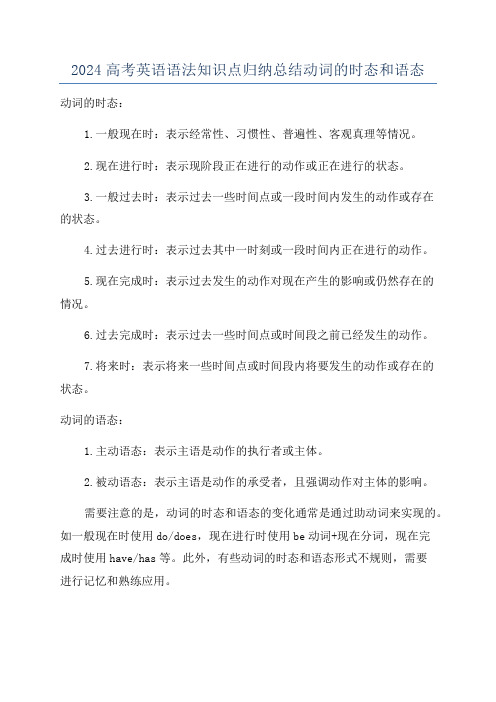
2024高考英语语法知识点归纳总结动词的时态和语态
动词的时态:
1.一般现在时:表示经常性、习惯性、普遍性、客观真理等情况。
2.现在进行时:表示现阶段正在进行的动作或正在进行的状态。
3.一般过去时:表示过去一些时间点或一段时间内发生的动作或存在
的状态。
4.过去进行时:表示过去其中一时刻或一段时间内正在进行的动作。
5.现在完成时:表示过去发生的动作对现在产生的影响或仍然存在的
情况。
6.过去完成时:表示过去一些时间点或时间段之前已经发生的动作。
7.将来时:表示将来一些时间点或时间段内将要发生的动作或存在的
状态。
动词的语态:
1.主动语态:表示主语是动作的执行者或主体。
2.被动语态:表示主语是动作的承受者,且强调动作对主体的影响。
需要注意的是,动词的时态和语态的变化通常是通过助动词来实现的。
如一般现在时使用do/does,现在进行时使用be动词+现在分词,现在完
成时使用have/has等。
此外,有些动词的时态和语态形式不规则,需要
进行记忆和熟练应用。
最新高中英语动词时态和语态专项练习题附答案
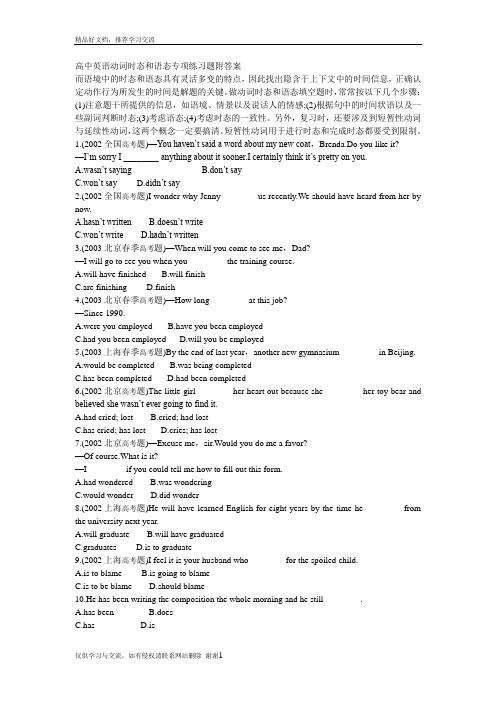
高中英语动词时态和语态专项练习题附答案而语境中的时态和语态具有灵活多变的特点,因此找出隐含于上下文中的时间信息,正确认定动作行为所发生的时间是解题的关键。
做动词时态和语态填空题时,常常按以下几个步骤:(1)注意题干所提供的信息,如语境、情景以及说话人的情感;(2)根据句中的时间状语以及一些副词判断时态;(3)考虑语态;(4)考虑时态的一致性。
另外,复习时,还要涉及到短暂性动词与延续性动词,这两个概念一定要搞清。
短暂性动词用于进行时态和完成时态都要受到限制。
1.(2002全国高考题)—You haven’t said a word about my new coat,Brenda.Do you like it?—I’m sorry I ________ anything about it sooner.I certainly think it’s pretty on you.A.wasn’t sayingB.don’t sayC.won’t sayD.d idn’t say2.(2002全国高考题)I wonder why Jenny ________us recently.We should have heard from her by now.A.hasn’t writtenB.doesn’t writeC.won’t writeD.hadn’t written3.(2003北京春季高考题)—When will you come to see me,Dad?—I will go to see you when you ________ the training course.A.will have finishedB.will finishC.are finishingD.finish4.(2003北京春季高考题)—How long ________ at this job?—Since 1990.A.were you employedB.have you been employedC.had you been employedD.will you be employed5.(2003上海春季高考题)By the end of last year,another new gymnasium ________ in Beijing.A.would be completedB.was being completedC.has been completedD.had been completed6.(2002北京高考题)The little girl ________her heart out because she ________ her toy bear and believed she wasn’t ever going to find it.A.had cried; lostB.cried; had lostC.has cried; has lostD.cries; has lost7.(2002北京高考题)—Excuse me,sir.Would you do me a favor?—Of course.What is it?—I ________ if you could tell me how to fill out this form.A.had wonderedB.was wonderingC.would wonderD.did wonder8.(2002上海高考题)He will have learned English for eight years by the time he ________ from the university next year.A.will graduateB.will have graduatedC.graduatesD.is to graduate9.(2002上海高考题)I feel it is your husband who ________for the spoiled child.A.is to blameB.is going to blameC.is to be blameD.should blame10.He has been writing the composition the whole morning and he still ________.A.has beenB.doesC.hasD.is11.If city noises ________ from increasing,people ________ shout to be heard even at the dinner table 20 years from now.A.are not kept; will have toB.are not kept; have toC.do not keep; will have toD.do not keep; have to12.The price ________,but I doubt whether it will remain so.A.went downB.will go downC.has gone downD.was going down13.—How long ________ each other before they ________ married?—For about a year.A.have they known; getB.did they know; getC.do they know; are going to getD.had they known; got14.You can’t move in right now.The house ________.A.has paintedB.is paintedC.is being paintedD.is painting15.—Hey,look where you are going!—Oh,I’m terribly sorry.________.A.I’m not noticingB.I wasn’t noticingC.I haven’t noticedD.I don’t notice16.The reporter said that the UFO ________ east to west when he saw it.A.was travelingB.traveledC.had been travelingD.was to travel17.—Is this raincoat yours?—No,mine ________ there behind the door.A.is hangingB.has hangC.hangsD.hang18.I turned around and saw everybody ________ at a man who ________ loudly in a foreign language.A.was staring; was shoutingB.was staring; shoutingC.staring; shoutingD.stared; shouted19.Henry remained silent for a moment.He ________.A.thoughtB.had thoughtC.was thinkingD.was thought20.We would like to go and thank him ourselves,but we ________ out his address yet,A.haven’t foundB.hadn’t foundC.didn’t findD.don’t find21.Shirley ________ a book about China last year but I don’t know whether she has finished.A.has writtenB.wroteC.had writtenD.was writing22.—Have you got your test result?—Not yet.The papers ________.A.are not correctingB.have not correctedC.are still being correctedD.have already been corrected23.See the clouds! It ________ rain!A.willB.is going toC.mustD.certainly24.Do I have to take this medicine? It ________ so terrible.A.tastesB.is tastingC.is tastedD.has tasted25.Don’t take the magazine away.It ________ me.A.is belonged toB.belongs toC.was belonged toD.is belonging to26.Is this the third time that you ________ late?A.have beenB.amC.wasD.had been27.—Do you know when Tom ________ from abroad?—Perhaps it will be a long time before he ________.A.will come; will comees; will comeC.will come; comeses; comes28.My uncle said that he would telephone but I ________ from him so far.A.didn’t hearB.hadn’t heardC.haven’t heardD.won’t hear29.The telephone ________ four times in the last hour,and each time it ________ for my roommate.A.has rung; wasB.has been ringing; isC.had rung; wasD.rang; has been30.A storm ________ by a calm.A.is often being followedB.was often followedC.is often followedD.has often been followed31.The pen I ________ I ________ is on my desk,right under my nose.A.think; lostB.thought; had lostC.think; had lostD.thought; lost32.—We could have walked to the station.It was so near.—Yes,a taxi ________ at all necessary.A.wasn’tB.hadn’t beenC.couldn’t beD.won’t be33.A friend of mine returned to his house after a holiday only to find it ________.A.to be brokenB.had broken intoC.was brokenD.had been broken into34.They believed that by using computers the production of their factory ________.A.will greatly increaseB.would greatly increaseC.would be increased greatlyD.will have been greatly increased35.His eyes shone brightly when he finally received the magazines he ________.A.had long been expectedB.had long expectedC.has long expectedD.was long expected36.—Do you like the new pen?—Yes,it ________ very well.A.is writtenB.is writingC.writesD.wrote37.—Oh,it’s you? I didn’t recognize you.—I ________ my hair cut,and I ________ new glass.A.had; was wearingB.have had; am wearingC.had; woreD.have had; wear38.As she ________ the newspaper,Granny ________ asleep.A.read; was fallingB.was reading; fellC.was reading; was fallingD.read; fell39.However hard you ________,you will never succeed in pleasing her.A.tryB.will tryC.should tryD.would try40.—Can I help you,sir?—Yes,I bought this radio yesterday,but it ________.A.didn’t workB.won’t workC.can’t workD.doesn’t work41.—How are you today?—Oh,I ________ as ill as I do now for a very long time.A.didn’t feelB.wasn’t feelingC.don’t feelD.haven’t felt42.When Jack arrived he learned Mary ________ for about an hour.A.had goneB.had set offC.had leftD.had been away43.By this time tomorrow we ________ the machine.A.have repairedB.shall have repairedC.will repairD.would repair44.I don’t think Jim saw me,he ________ into space.A.just staredB.was just staringC.has just staredD.had just stared45.Helen ________ her key in the office so she had to wait until her husband ________ home.A.had left; cameB.has left; comesC.left; had comeD.had left; would come46.—You have left the light on.—Oh,so I have.________ and turn it off.A.I’ll goB.I’ve goneC.I goD.I’m going47.This is Ted’s pho to.We miss him a lot.He ________ trying to save a child in earthquake.A.killedB.is killedC.was killedD.was killing48.The notice ________ “No smoking.”A.is wroteB.readsC.writesD.is read49.Good care must ________ babies particularly while they are ill.A.takeB.take ofC.be takenD.be taken of50.Shortly after we ________,a waiter came over to our table with a smile.A.seatedB.were seatedC.sat ourselvesD.had seated51.—You look pale,what troubled you?—I ________ my dead friend.A.am thinking aboutB.was thinking aboutC.had thought aboutD.will think about52.John and I ________ friends for eight years.We first got to know each other at a Christmas party.But we ________ each other a couple of times before that.A.had been; have seenB.have been; have seenC.have been; had seenD.had been; had seen53.Do make sure that you ________ a seat today!A.gotB.getC.shouldD.have get54.We ________ at the house as we ________ of buying it.A.looked; were thinkingB.were looking; were thinkingC.were looking; thoughtD.looked; had thought55.—I’m told that you are leaving for Beijing.—Who ________ so?A.saidB.had saidC.saysD.has said56.I ________ the room to be empty but found it occupied.A.had thoughtB.have thoughtC.didn’t thinkD.was thinking57.Selecting a mobile phone for personal use is no easy task because technology ________ so rapidly.A.will have changedB.has changedC.is changingD.will change58.I ________ ping-pong quite well,but I haven’t had time to play since the new year.A.will playB.have playedC.playedD.play59.Visitors ________ not to touch the exhibits.A.will requestB.are requestedC.are requestingD.request60.They ________ a snowstorm on their way home.A.caught inB.had caughtC.were caughtD.were caught in高考能力测试步步高英语基础训练8答案基础训练8动词(三)动词时态和语态1~5 DADBD 6~10 BBCAD11~15 ACDCB 16~20 AAACA21~25 DCBAB 26~30 ACCAC31~35 BADCC 36~40 CBBAD41~45 DDBBA 46~50 ACBDB51~55 BCBBC5 6~60 ACDBD【解析】1.用过去时表达没能早说之意。
高中英语基础语法复习八:动词时态与语态
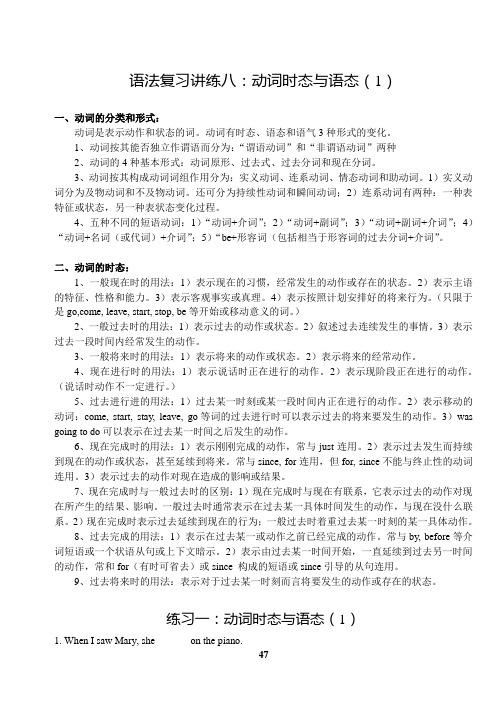
语法复习讲练八:动词时态与语态(1)一、动词的分类和形式:动词是表示动作和状态的词。
动词有时态、语态和语气3种形式的变化。
1、动词按其能否独立作谓语而分为:“谓语动词”和“非谓语动词”两种2、动词的4种基本形式:动词原形、过去式、过去分词和现在分词。
3、动词按其构成动词词组作用分为:实义动词、连系动词、情态动词和助动词。
1)实义动词分为及物动词和不及物动词。
还可分为持续性动词和瞬间动词;2)连系动词有两种:一种表特征或状态,另一种表状态变化过程。
4、五种不同的短语动词:1)“动词+介词”;2)“动词+副词”;3)“动词+副词+介词”;4)“动词+名词(或代词)+介词”;5)“be+形容词(包括相当于形容词的过去分词+介词”。
二、动词的时态:1、一般现在时的用法:1)表示现在的习惯,经常发生的动作或存在的状态。
2)表示主语的特征、性格和能力。
3)表示客观事实或真理。
4)表示按照计划安排好的将来行为。
(只限于是go,come, leave, start, stop, be等开始或移动意义的词。
)2、一般过去时的用法:1)表示过去的动作或状态。
2)叙述过去连续发生的事情。
3)表示过去一段时间内经常发生的动作。
3、一般将来时的用法:1)表示将来的动作或状态。
2)表示将来的经常动作。
4、现在进行时的用法:1)表示说话时正在进行的动作。
2)表示现阶段正在进行的动作。
(说话时动作不一定进行。
)5、过去进行进的用法:1)过去某一时刻或某一段时间内正在进行的动作。
2)表示移动的动词:come, start, stay, leave, go等词的过去进行时可以表示过去的将来要发生的动作。
3)was going to do可以表示在过去某一时间之后发生的动作。
6、现在完成时的用法:1)表示刚刚完成的动作,常与just连用。
2)表示过去发生而持续到现在的动作或状态,甚至延续到将来。
常与since, for连用,但for, since不能与终止性的动词连用。
高中语法复习动词时态与语态
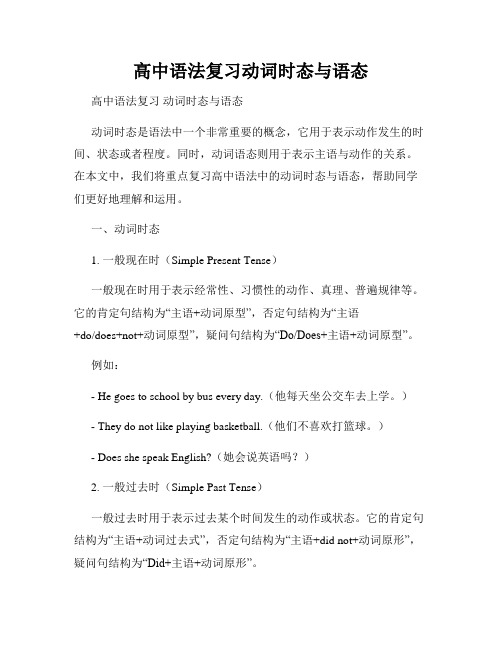
高中语法复习动词时态与语态高中语法复习动词时态与语态动词时态是语法中一个非常重要的概念,它用于表示动作发生的时间、状态或者程度。
同时,动词语态则用于表示主语与动作的关系。
在本文中,我们将重点复习高中语法中的动词时态与语态,帮助同学们更好地理解和运用。
一、动词时态1. 一般现在时(Simple Present Tense)一般现在时用于表示经常性、习惯性的动作、真理、普遍规律等。
它的肯定句结构为“主语+动词原型”,否定句结构为“主语+do/does+not+动词原型”,疑问句结构为“Do/Does+主语+动词原型”。
例如:- He goes to school by bus every day.(他每天坐公交车去上学。
)- They do not like playing basketball.(他们不喜欢打篮球。
)- Does she speak English?(她会说英语吗?)2. 一般过去时(Simple Past Tense)一般过去时用于表示过去某个时间发生的动作或状态。
它的肯定句结构为“主语+动词过去式”,否定句结构为“主语+did not+动词原形”,疑问句结构为“Did+主语+动词原形”。
例如:- I watched a movie last night.(昨晚我看了一场电影。
)- They did not go to the party.(他们没有参加派对。
)- Did you finish your homework?(你完成作业了吗?)3. 一般将来时(Simple Future Tense)一般将来时用于表示将来某个时间会发生的动作或状态。
它的肯定句结构为“主语+will+动词原形”,否定句结构为“主语+will not+动词原形”,疑问句结构为“Will+主语+动词原形”。
例如:- She will go to Beijing next week.(她下周将去北京。
)- We will not have a meeting tomorrow.(明天我们不开会。
高中英语语法专练之动词的时态及语态
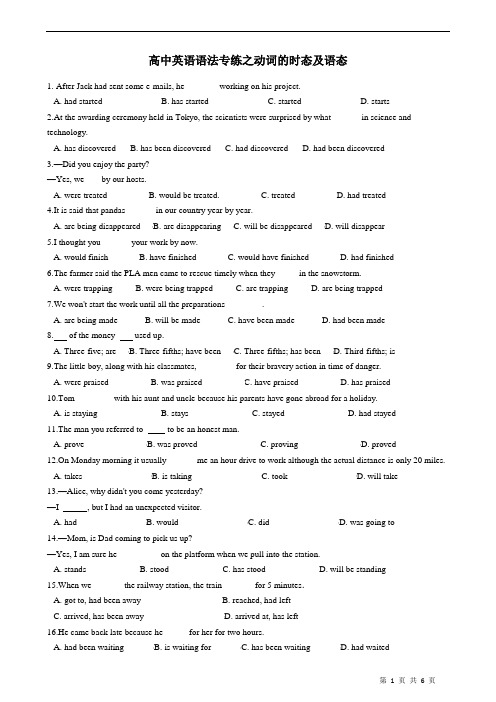
高中英语语法专练之动词的时态及语态1. After Jack had sent some e-mails, he _______ working on his project.A. had startedB. has startedC. startedD. starts2.At the awarding ceremony held in Tokyo, the scientists were surprised by what ______ in science and technology.A. has discoveredB. has been discoveredC. had discoveredD. had been discovered3.—Did you enjoy the party?—Yes, we ___ by our hosts.A. were treatedB. would be treated.C. treatedD. had treated4.It is said that pandas ______ in our country year by year.A. are being disappearedB. are disappearingC. will be disappearedD. will disappear5.I thought you ______ your work by now.A. would finishB. have finishedC. would have finishedD. had finished6.The farmer said the PLA men came to rescue timely when they _____in the snowstorm.A. were trappingB. were being trappedC. are trappingD. are being trapped7.We won't start the work until all the preparations ________.A. are being madeB. will be madeC. have been madeD. had been made8. of the money used up.A. Three-five; areB. Three-fifths; have beenC. Three-fifths; has beenD. Third-fifths; is9.The little boy, along with his classmates, ________ for their bravery action in time of danger.A. were praisedB. was praisedC. have praisedD. has praised10.Tom ________ with his aunt and uncle because his parents have gone abroad for a holiday.A. is stayingB. staysC. stayedD. had stayed11.The man you referred to to be an honest man.A. proveB. was provedC. provingD. proved12.On Monday morning it usually ______ me an hour drive to work although the actual distance is only 20 miles.A. takesB. is takingC. tookD. will take13.—Alice, why didn't you come yesterday?—I , but I had an unexpected visitor.A. hadB. wouldC. didD. was going to14.—Mom, is Dad coming to pick us up?—Yes, I am sure he _________ on the platform when we pull into the station.A. standsB. stoodC. has stoodD. will be standing15.When we _______the railway station, the train _______for 5 minutes.A. got to, had been awayB. reached, had leftC. arrived, has been awayD. arrived at, has left16.He came back late because he _____ for her for two hours.A. had been waitingB. is waiting forC. has been waitingD. had waited17.— What you in the classroom at the moment?— The coming charity show for Yingjiang, Yunnan.A. are, talking aboutB. did, talk aboutC. have, talked aboutD. do, talk about18.— Would you like to come to travel with me?— Sorry, you know my final exam ______ and I'm extremely busy right now.A. comesB. has comeC. will be comingD. is coming19.I found the film hard to follow because it _______ when I arrived.A. had begunB. was beginningC. has begunD. would begin20.Since the time humankind started gardening, we _____to make our environment more beautiful.A. tryB. have been tryingC. are tryingD. will try21.The great leader often inspires younger generations that only through hard work .A. has happiness been achievedB. will happiness be achievedC. happiness has been achievedD. happiness will be achieved22.A Midsummer Night's Dream ______at the Theatre Royal on 19th June, and then tours throughout Scotland.A. opensB. is openedC. will openD. will be opened23.—It's been so windy in the past three days.—We haven't seen the worst of it yet. Even stronger wind ________ tonight.A. has forecastB. is forecastingC. is forecastD. will be forecast24.The woman murdered her friend and to .A. was sentenced, deathB. sentencing, dieC. sentenced, deathD. sentenced, die25.Hurry up! The concert __________ for more than ten minutes!A. has been onB. beganC. has begunD. had begun26.Little _____what you said. I wish you had repeated it.A. did I understandB. I understoodC. I did understandD. have I understood27.The country life he was used to ________ greatly since 1992.A. changeB. has changedC. changingD. have changed28.The day we looked forward to ________ at last.A. comingB. had comeC. cameD. is coming29.—When will the official permission be given for the event to take place?—Not until ________ good preparations for it.A. have you madeB. you will have madeC. will you have madeD. you have made30.The coat made of this kind of cloth well. I think it is worthy .A. washes; buyingB. is washed; buyingC. washes; to be boughtD. is washed; to be bought31. They are living with their parents for the moment because their own house ____.A. is being rebuiltB. has been rebuiltC. is rebuiltD. has rebuilt32.The recent economic situation ______ into consideration, the manager ______ down on the amount of money invested in the stock market.A. was taken; cutB. taken; cutC. taking; cutsD. to take; cutting33.Liu Xiang is believed _________ over $ 20 million in advertisements last year alone.A. to earnB. have earnedC. to have earnedD. having earned34.—Did you catch what I said?—Sorry. I ______ a text message just now.A. had answeringB. have answeredC. would answerD. was answering35.While China an anti-terrorist security network, the nation still needs to prepare its people the war on terror, therefore its powerful weapon.A. knits, to fight, to gatherB. is knitting, fighting, gatheringC. is knitting, to fight, gatheringD. has knitted, to fight, gathering36.Not until he got seriously ill _______ the importance of health.A. he had realizedB. he realizedC. had he realizedD. did he realize37.The project alongside with the experiment we had once devoted so much time ______ perfectly.A. to work outB. to working outC. to worked outD. has worked out38.Not until my later thirties ______ the important discovery: giving away things makes life so much more exciting.A. I madeB. I had madeC. did I makeD. had I made39.The film you referred to ________ us interested.A. makingB. having madeC. has madeD. make40.At present, many new workers ________ and in six months they will be sent to build a new railway.A. are being trainedB. are trainingC. will trainD. will be trained41.I don't know if it ______ tomorrow. If it ______ tomorrow, my friends and I will go to the cinema.A. rains...rainsB. will rain...will rainC. rains...will rainD. will rain...rains42.What a helpful girl she is! ___________. Which sentence can Not be best used to praise the girl highly?A. She always helps others.B. She is continually helping others.C. She is constantly helping others.D. She is always helping others.43.The ruins of the ancient city _______ of great cultural value and should be preserved for research in the future.A. isB. areC. wasD. were44.The Chinese embassy didn't directly solve my problem, but I feel thankful that it ______me some advice at least.A. had offeredB. would offerC. offersD. offered45. “Never for a second,” the boy says, “______ that my father would come to my rescue.”A. I doubtedB. do I doubtC. I have doubtedD. did I doubt46.—Is it convenient for you to go shopping with me tomorrow morning?—I'm afraid not. I _______ then.A. will have a meetingB. am about to have a meetingC. am having a meetingD. will be having a meeting47.When the moon had risen, we ________ on the grass, listening to the wind ________ in the trees.A. lay; whisperingB. lied; whisperingC. laid; whisperD. lay; to whisper48. The students have been working hard on their lessons and their efforts ______ success in the end.A. rewardedB. were rewardedC. will rewardD. will be rewarded49.My English teacher, as well as her students, ________ to perform at the party last night.A. invitedB. were invitedC. was invitedD. were inviting50. A rescue worker risked his life saving two tourists who _________ in the mountains for two days.A. are trappingB. have been trappedC. were trappingD. had been trapped答案解析部分1.【答案】C2.【答案】D3.【答案】A4.【答案】B5.【答案】C6.【答案】B7.【答案】C8.【答案】C9.【答案】B10.【答案】A11.【答案】D12.【答案】A13.【答案】D14.【答案】D15.【答案】A16.【答案】A17.【答案】A18.【答案】D19.【答案】A20.【答案】B21.【答案】B22.【答案】A23.【答案】C24.【答案】A25.【答案】A26.【答案】A27.【答案】B28.【答案】C29.【答案】D30.【答案】C31.【答案】A32.【答案】B33.【答案】C34.【答案】D35.【答案】C36.【答案】D37.【答案】C38.【答案】C39.【答案】C40.【答案】A41.【答案】D42.【答案】A43.【答案】B44.【答案】D45.【答案】D46.【答案】D47.【答案】A48.【答案】D49.【答案】C50.【答案】D。
高中英语语法动词时态与语态

动词的时态与语态一、一般体1.一般体中的一般现在时、一般过去时分别表示现在、过去的经常性、习惯性动作或状态。
所谓一般体,即不表进行,又不表完成例:We have meals three times a day我们一日吃三餐(现在的习惯)He is always ready to help others.他总是乐于助人(现在的状态)When I was a boy, I often went to play in that park.我小时候常去那个公园玩(过去的习惯)2.一般现在时一一客观真理、科学事实例:The sun rises in the east.太阳从东方升起3.一般现在时还可以用在if, unless, even if引导的条件状语从句中,由when, before,until(till), as soon as, the moment, once 引导的时间状语从句中,由no matter what/who/which/when/where/how 或whatever, whoever, whichever, whenever, wherever, however引导的让步状语从句中,这时主句往往表示将来(出现will/shall/can/must )或主句是祈使句例:I ll go with you as soon as I finish my work. 我一完成工作就跟你走If city noises are not kept from increasing, people will have to shout to be heard even at the dinner table 20 years from now.如果不阻止城市噪音继续增加的话,20年后人们同在饭桌旁也得大喊着才能被听到。
Whatever you say, I will not change my mind.无论你说什么,我都不会改变主意4.语境中的一般过去时,往往表示“刚才,在过去”之意,暗示现在已“不再这样”例:—come on in, Peter. I want to show you something.皮特,进来。
高中英语 高三二轮复习语法-动词的时态和语态

高三一轮语法复习——动词的时态和语态----By Echo 一、动词时态1、一般现在时1) 表示现在习惯性、反复性的动作或当前的状态。
时间状语:always / usually / often / sometimes / seldom / every day / once a month / now and then / occasionally等。
I have meals three times a day.He is always ready to help others.2) 客观真理。
The sun rises in the east.3) 在when / while / if / unless / as soon as等连词引导的状语从句中,一般现在表现在将来。
(if 主将从现)You’d better write down her phone number before you forget it.4) Here / there 开头的句子,表示正在发生的动作或存在的状态。
Here comes the bus.There goes the bell.5) 文章标题、戏剧、电影等的剧本或图片的文字说明。
Hundreds of people die in the earthquake.When the curtain rises, Juliet in sitting at her desk.6) 一般现在表将来,表示按照规定、计划或安排要求发生的动作。
常用于介绍火车时刻表、飞机时刻表、作息安排表。
The plane for Canada departs at 9:15 a.m.The programme ends at 11:10 p.m.2、一般过去时1)表示过去某个时间完成或一度存在的状态。
时间状语:then / yesterday / the other day / in 1990 / 5 years ago / last year等。
高中英语语法动词的时态和语态详解及练习附答案

动词的时态和语态一、知识框架二、知识梳理动词不定式的基本形式是“to+动词原形”有时可以不带to,否定式:not + (to) do。
动词不定式没有人称和数的变化,在句子中不能作谓语,但具有名词、形容词、副词的特征,可以担任主语、表语、宾语、定语、状语和宾语补足语。
动词不定式仍保留动词的一些特点。
一)不定式的句法功能(1)作主语:不定式作主语时,一般表具体的、个别的、一次性的或具有将来意义的动作。
To forgive is the best virtue of life.人生最好的美德是宽恕。
To finish the work in ten minutes is very hard. 十分钟之内完成这项工作是很难的。
To lose your heart means failure. 灰心意味着失败。
若主语较长,常用it作形式主语,真正的主语不定式置于句后,上面两句可用如下形式:It is very hard to finish the work in ten minutes.It means failure to lose your heart.常用句式有:It+be+名词+to doIt takes sb+some time+to doIt+be+形容词+of/for sb +to doHow + adj. + it is + to do sth.!①如果句中的形容词表示人物特征或品质,常同of搭配构成“It is + 形容词+of+代词(名词)+不定式”句型。
如:bold, brave, careful, careless, considerate, cruel, rude, generous, right, wrong, kind, nice, good, polite, clever, wise, foolish, silly等。
②表示事物性质的形容词如easy, difficult, hard, important, impossible, possible, safe, dangerous, necessary常同for 搭配。
高中英语动词的时态和语态

高中英语动词的时态和语态高中英语动词的时态和语态一、动词的时态时态是谓语动词所表示的动作或情况发生时间的各种形式。
常用的有9种,即一般现在时、一般过去时、一般将来时、现在进行时、过去进行时、现在完成时、过去完成时、过去将来时、现在完成进行时(其他比较常用的还有将来进行时、将来完成时)。
(一)一般现在时I、构成:肯定式:1) ( I )+ am / do2)(单数名词、不可数名词、动词不定式和其短语、动名词及其短语、从句、HIt )+ is/does3) (复数名词、We, You, They) + are /do否定式:1) ( I ) am not / don’t do2) (单数名词、不可数名词、动词不定式和其短语、动名词及其短语、从句、HIt )is not /doesn’t do3) (复数名词、We, You, They) are not /don’t do 疑问式:1) am ( I ) / do ( I ) do …?2) is(单数名词、不可数名词、动词不定式和其短语、动名词及其短语、从句、HIt )…+?3) does(单数名词、不可数名词、动词不定式和其短语、动名词及其短语、从句、HIt )+ do…+?4) are (复数名词、We, You, They) …?5) do (复数名词、We, You, They) do … ?II、用法:1、表示经常性、习惯生的动作;表示现在的状态、特征和真理。
句中常用often, usually, every + 时间名词等时间状语。
如:1)地球绕着太阳转。
The earth moves around the sun. (真理)2)我们非常高兴。
We are very happy. (现在的状态)3)他每天坚持做早锻炼。
Haking morning exvery day.(经常性的动作)2、在时间状语从句和条件状语从句中,用一般现在时表示将来。
高中英语知识点归纳动词的时态和语态

高中英语知识点归纳动词的时态和语态动词是英语中最重要的词类之一,学好动词的时态和语态对于高中英语学习至关重要。
时态和语态在语法和意义上都有着重要的作用,它们可以帮助我们准确表达动作的发生时间以及动作的主体和客体关系。
本文将对动词的时态和语态进行归纳总结,帮助高中学生更好地掌握这一知识点。
一、动词的时态1. 一般现在时:表示经常性或普遍性的动作或状态。
结构为"主语 + 动词原形(第三人称单数形式加-s)"。
例句:She dances every Friday evening.2. 现在进行时:表示现阶段正在进行的动作。
结构为"主语 + be动词(am/is/are)+ 现在分词"。
例句:They are playing basketball now.3. 一般过去时:表示过去某个时间发生的动作或状态。
结构为"主语 + 动词过去式"。
例句:He studied English last night.4. 过去进行时:表示过去某一时刻的持续性动作。
结构为"主语 + was/were + 现在分词"。
例句:I was reading a book when she called me.5. 现在完成时:表示从过去某一时刻开始一直延续到现在的动作或状态。
结构为"主语 + have/has + 过去分词"。
例句:She has travelled to many countries.6. 过去完成时:表示过去某一时刻之前完成的动作。
结构为"主语 + had + 过去分词"。
例句:They had already left when I arrived.7. 将来时:表示将来某个时间会发生的动作或状态。
结构为"主语 + will/shall + 动词原形"。
例句:I will call you tomorrow.8. 过去将来时:表示过去某个时间之后会发生的动作或状态。
高中英语动词时态语态精讲及练习
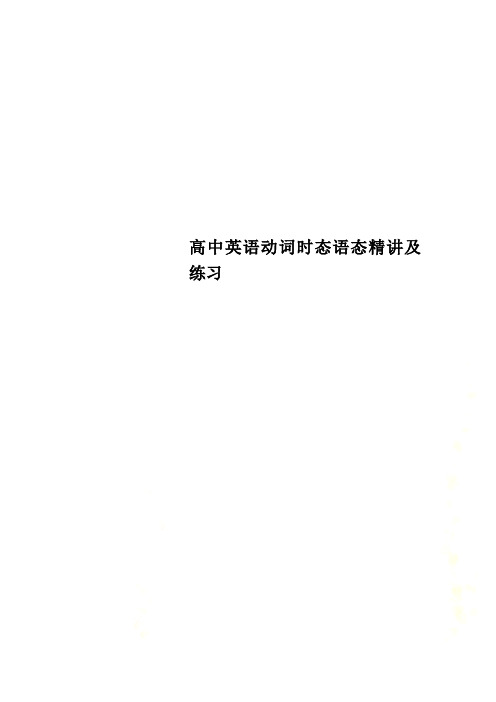
高中英语动词时态语态精讲及练习高中英语动词时态语态精讲一、时态 (一) 现在进行时用法注意点: 1.状态性动词不用进行时态,包括 (1)be 和have,或者含有be 和have 意义的动词,如:belong to, contain, depend on,等; (2)feel, sound, smell, taste 等连系动词; (3)hear, see, find 等表示结果的动词; (4)表示心理或情感状态的动词,如:believe, love, want, understand, wish 等; 2.进行时态和副词always, forever 等连用时,往往带有一定的感情色彩,如赞扬、批评、不满、抱怨等;eg. He is always criticizing us. (二) 一般过去时与过去进行时的区别: 1.过去进行时表示动作的未完成性、持续性,着眼于动作的过程;一般过去时表示动作的完成,即动作发生过,且已结束,着眼于结果;如: She was writing a report last night and I don ’t know if she has finished it.(昨晚一直在写) She wrote a report last night.(表示昨晚写了,并且写好了) 2.过去进行时与always, forever 等词连用表示一定的感情色彩; He was always throwing things about. (表示不满或讨厌) (三) 将来时的几种表达: A B C D be going to 表示“计划、打算、安排将要做的事”时,主语只能是人说话人说话之前已考虑过的 主语是物时,表示说话人根据某种迹象主观推测可能发生的事 不能用于含有条件句的主句中(六)现在/过去完成进行时的用法:强调动作延续到说话时且还在进行;结构:have (has) / had been doing比较:They have repaired the road.(表示路已修好)They have been repairing the road. (表示路还在修)有时两者可替换:She has taught in this middle school for ten years.She has been teaching in this schoolfor ten years.注意:完成进行时不可与瞬间性动词连用,如:finish, go, marry等;(七)某些固定句型中时态是固定的:1.This / That / It is the first time +从句(用现在完成时)2.It’s / has been +一段时间+since从句(用过去时)3.It will be +一段时间+before从句(用一般现在时)/ It was +一段时间+before从句(用过去时)4. It’s time+从句(用过去时或should do)5.would rather+从句(用一般过去时/过去完成时)It’s getting late. I’d rather you took a taxi there.The film was boring. I’d rather I hadn’t gone to see it.二、语态语态概述英语的语态是通过动词形式的变化表现出来的。
高考英语 语法精讲精练 专题八 动词的时态和语态
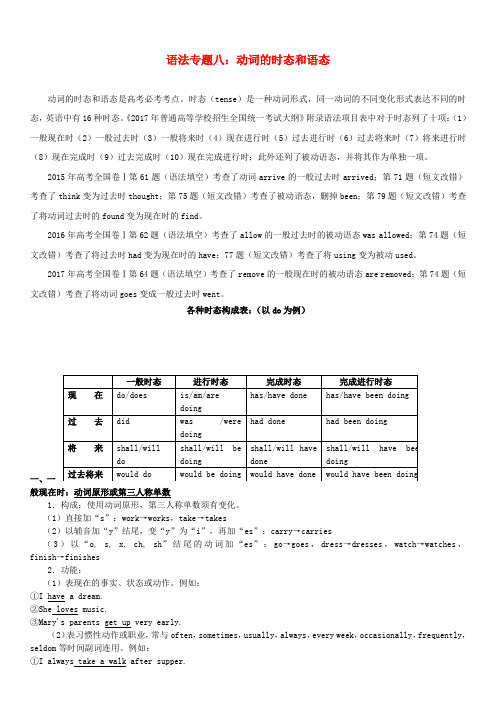
语法专题八:动词的时态和语态动词的时态和语态是高考必考考点。
时态(tense)是一种动词形式,同一动词的不同变化形式表达不同的时态,英语中有16种时态。
《2017年普通高等学校招生全国统一考试大纲》附录语法项目表中对于时态列了十项:(1)一般现在时(2)一般过去时(3)一般将来时(4)现在进行时(5)过去进行时(6)过去将来时(7)将来进行时(8)现在完成时(9)过去完成时(10)现在完成进行时;此外还列了被动语态,并将其作为单独一项。
2015年高考全国卷Ⅰ第61题(语法填空)考查了动词arrive的一般过去时arrived;第71题(短文改错)考查了think变为过去时thought;第75题(短文改错)考查了被动语态,删掉been;第79题(短文改错)考查了将动词过去时的found变为现在时的find。
2016年高考全国卷Ⅰ第62题(语法填空)考查了allow的一般过去时的被动语态was allowed;第74题(短文改错)考查了将过去时had变为现在时的have;77题(短文改错)考查了将using变为被动used。
2017年高考全国卷Ⅰ第64题(语法填空)考查了remove的一般现在时的被动语态are removed;第74题(短文改错)考查了将动词goes变成一般过去时went。
各种时态构成表:(以do为例)一、一般现在时:动词原形或第三人称单数1.构成:使用动词原形,第三人称单数须有变化。
(1)直接加“s”:work→works,take→takes(2)以辅音加“y”结尾,变“y”为“i”,再加“es”:carry→c arries(3)以“o, s, x, ch, sh”结尾的动词加“es”:go→goes,dress→dresses,watch→watches,finish→finishes2.功能:(1)表现在的事实、状态或动作。
例如:①I have a dream.②She loves music.③Mary's parents get up very early.(2)表习惯性动作或职业,常与often,sometimes,usually,always,every week,occasionally,frequently,seldom等时间副词连用。
高中英语动词时态语态讲解及练习

高中英语动词时态语态讲解及练习1、一般现在时主要用来表示人、事物的在状况和特点;表示常或性的作,句子中常有often, always, from time to time等状;表示客律和永恒真理等。
He usually goes to work at 7 o’ clock every morning.The earth goes around the sun.Guangzhou is situated in the south of China.考点一:表示永恒的真理,即使出在去的境中,仍用一般在。
如:I learned that the earth goes around the sun when I was in primary school.考点二:在和条件状从句中,代替一般将来;常用的引有::when, until, after, before, as soon as, once, the moment/the minute, the day;条件:if, unless, provided. If he accepts the job, he will get more money soon.考点三:在 make sure (certain), see to it, mind, care, matter+从句,从句用一般在代替一般将来。
So long as he works hard, I don’ t mind when he finishes the experiment.只要他努力工作,我不介意他什么候做完。
考点四:在 the more ⋯ the more ⋯越( ⋯⋯越⋯⋯ ) 句型中 , 若主句是一般将来 , 从句通常用一般在。
The harder you study, the better results you will get.2、现在进行时表或目前一段内正在行的活:或表感情色彩,加气。
高考英语语法要点细讲精练动词的时态及语态

高考英语语法要点细讲精练动词的时态(Tai)及语态【考纲解(Jie)读】动词的时态和语态历来(Lai)是高考题中考查的重头戏之一.测试重点放在根据特定语言(Yan)环境区别使用一般过去时和现在完成时;一般现在时(过去(Qu)时)与现在(过去)进行时;及物动词的被动用法;特定的时间状语中时态的使用;结合所获得的语言知识确定正确时态的能力等.综上所述,动词的时态和语态在高考测试中的地位非常重要.因而考生在复习备考中必须对本专题引起足够的重视.【知识要点】动词的时态一、一般现在时的用法1.经常性或习惯性的动作,常与表示频度的时间状语连用.时间状语: every...,sometimes,on SundayI leave home for school at 7 every morning.我每天早上七点离家去学校.2.客观真理,客观存在,科学事实.The earth moves around the sun.地球围着太阳转.Shanghai lies in the east of China.上海位于中国的东方.3.表示格言或警句中.Pride goes before a fall.骄者必败.注意:此用法如果出现在宾语从句中,即使主句是过去时,从句谓语也要用一般现在时. Columbus proved that the earth is round.哥伦布证明地球是圆的.4.现在时刻的状态、能力、性格、个性.比较:Now I put the sugar in the cup.现在我往杯子里放糖.I am doing my homework now.我在做作业.第一句用一般现在时,用于操作演示或指导说明的示范性动作,表示言行的瞬间动作.再如:Now watch me,I switch on the current and stand back. 第二句中的now是进行时的标志,表示正在进行的动作的客观状况,所以后句用一般现在时.二、一般过去时的用法1.在确定的过去时间里所发生的动作或存在的状态.时间状语有:yesterday,last week,an hour ago,the other day,in 1982等.Where did you go just now?刚才你去哪儿了?2.表示在过去一段时间内,经常性或习惯性的动作.When I was a child,I often played football in the street.我小的时候,经常在街上踢足球.3.句型:It is time for sb.to do sth.“到……时间了”“该……了”It is time sb.did sth.“时间已迟了”“早该……了”It is time for you to go to bed.你该睡觉了.It is time you went to bed.你早该睡觉了.would (had)rather sb.did sth.表示“宁愿某人做某事”4.wish,wonder,think,hope 等用(Yong)过去时,作试探性的询问、请求、建议等.I thought you might have some. 我以(Yi)为你想要一些.比(Bi)较:一般过去时表示的动作(Zuo)或状态都已成为过去,现已不复存在.Christine was an invalid all her life.她已不(Bu)在人间.Christine has been an invalid all her life.她现在还活着.Mrs.Darby lived in Kentucky for seven years.达比太太已不再住在肯塔基州.Mrs.Darby has lived in Kentucky for seven years.现在还住在肯塔基州,有可能指刚离去.注意:用过去时表示现在,表示委婉语气.动词want,hope,wonder,think,intend 等.Did you want anything else?您还要点别的吗?情态动词 could,wouldCould you lend me your bike?能借用一下你的自行车吗?ed to/be used to1)used to+do:“过去常常”表示过去习惯性的动作或状态,但如今已不存在.Mother used not to be so forgetful.母亲以前没有这么健忘.Scarf used to take a walk.Scart过去常常散步.2)be used to+doing:对……已感到习惯,或“习惯于”,to是介词,后需加名词或动名词. Scarf is used to taking a walk.Scart现在习惯于散步.三、一般将来时1.shall用于第一人称,常被will 所代替.will 在陈述句中用于各人称,在征求意见时常用于第二人称.Which paragraph shall I read first我应该先读哪一段2.be going to+不定式,表示将来.1)主语的意图,即将做某事.What are you going to do tomorrow?明天你打算干什么?2)计划,安排要发生的事.The play is going to be produced next month.这部戏预计要下个月拍.3)有迹象要发生的事Look at the dark clouds,there is going to be a storm.看那乌云,要来暴风雨了.4)be+不定式表将来,按计划或正式安排将发生的事.We are to discuss the report next Saturday.我们打算下周六讨论这个报告.5)be about to+不定式,意为马上做某事.He is about to leave for Beijing.他正打算动身去北京.注意:be about to 不能与tomorrow,next week 等表示明确将来时的时间状语连用.3.be going to/will用于条件句时, be going to表将来will表意愿If you are going to make a journey,you’d better get ready for it as soon as possible.如果你打算去旅行,最好尽快准备好.Now if you will take off your clothes,we will fit the new clothes on you in front of the mirror.如果你愿意脱下身上穿的衣服,我们就可以在镜子前给你试穿一下新衣服.4.be to和be going tobe to 表示客观安排或受人指示而做某事.be going to 表示主观的打算或(Huo)计划.I am to play football tomorrow afternoon. (客观安(An)排)I’m going to play football tomorrow afternoon.(主观(Guan)安排)5.一般现(Xian)在时表将来1)以下(Xia)动词:,go,arrive,leave,start,begin,return的一般现在时表将来.这主要用来表示在时间上已确定或安排好的事情.The train leaves at six tomorrow morning. 火车明早六点发车.2)倒装句,表示动作正在进行车来了.There goes the bell.=The bell is ringing.铃响了.3)在时间或条件句中.不是,ask him to wait for me.比尔来了后,让他等我.I’ll write to you as soon as I arrive there.我一到那儿就给你写信.4)在动词hope,take care that,make sure that等后边.Make sure that the windows are closed before you leave the room.离开房间前一定要确保窗户都关上了.6.用现在进行时表示将来意为:“意图”“打算”“安排”常用于人.常用词为,go,start,arrive,leave,stay等.I’m leaving tomorrow.我打算明天动身.Are you staying here till next week? 你打算在这儿住到下周吗?四、现在完成时现在完成时用来表示之前已发生或完成的动作或状态,其结果的确和现在有联系.动作或状态发生在过去但它的影响现在还存在;也可表示持续到现在的动作或状态.其构成: have (has)+过去分词.1.比较过去时与现在完成时1)过去时表示过去某时发生的动作或单纯表达过去的事情,强调动作;现在完成时为过去发生的,强调过去的事情对现在的影响,强调的是影响.2)过去时常与具体的时间状语连用,而现在完成时通常与模糊的时间状语连用,或无时间状语.3)现在完成时可表示持续到现在的动作或状态,动词一般是延续性的,如live,teach,learn,work,study,know.过去时常用的非持续性动词有,go,leave,start,die,finish,,get married等.I saw this film yesterday.我昨天看了这部电影.(强调看的动作发生过了.)I have seen this film.这部电影我看过了.(强调对现在的影响,电影的内容已经知道了.)She has returned from Paris.她已从巴黎回来了.She returned yesterday.她昨天回来了.He has been in the League for three years.(在团内的状态可延续)He has been a League member for three years.(是团员的状态可持续)句子中如有过去时的时间副词如 yesterday,last,week,in 1960时,不能使用现在完成时,要用过去时.(错)Tom has written a letter to his parents last night.(对)Tom wrote a letter to his parents last night.2.用于现在完成时的句型1)It is the first/second time....that...结构中的从句部分,用现在完成时.It is the first time that I have visited the city.这是我(Wo)第一次参观这座城市.2)This is the...that...结(Jie)构,that 从句要用现在完(Wan)成时.This is the best film that I’ve (ever)seen.这是我看(Kan)过的最好的电影.This is the first time (that)I’ve heard him sing.这是我第一次听他(Ta)唱歌.注意:非延续性动词的否定形式可以与表示延续时间的状语连用.即动作不发生的状态是可以持续的.(错)I have received his letter for a month.(对)I haven’t received his letter for almost a month.3.比较since和forsince 用来说明动作起始时间,for用来说明动作延续时间长度.I have lived here for more than twenty years.我在这儿住了20多年了.I have lived here since I was born.我自出生就住在这儿.I have not heard from my uncle for a long time.我好久没收到叔叔的信了.注意:并非有for 作为时间状语的句子都用现在完成时.I worked here for more than twenty years. 我在这里工作过20多年.(我现在已不在这里工作.)I have worked here for many years.我在这里工作了多年了.(现在我仍在这里工作.)小窍门:当现在完成时+一段时间,这一结构中,我们用下面的公式转化,很容易就能排除非延续动词在完成时中的误用.汤姆学习俄语有3年了.(对)Tom has studied Russian for three years.=Tom began to study Russian three years ago,and is still studying it now.Harry结婚6年了.(错)Harry has got married for six years.=Harry began to get married six years ago,and is still getting married now.显然,第二句不对,它应改为 Harry got married six years ago.或Harry has been married for six years.4.since的四种用法1) since+过去一个时间点(如具体的年、月、日期、钟点、1980,last month,half past six).I have been here since 1989.我自1989年就在这儿.2)since+一段时间+agoI have been here since five months ago.自五个月前我就一直在这儿.3)since+从句Great changes have taken place since you left.自从你走后发生了很大的变化.4)It is+一段时间+since从句It is two years since I became a postgraduate student.自从我考上研究生已有两年了.5.延续动词与瞬间动词1) 用于完成时的区别延续动词表示经验、经历;瞬间动词表示行为的结果,不能与表示段的时间状语连用.他已完成了那项工作. (表结果)I’ve known him since then.我从那时起就认识他了.(表经历)2)用于till/until从句的差异延续动词用于肯定句,表示“做……直到……” 瞬间动词用于否定句,表示“到……,才……”. He didn’o’clock.他(Ta)到10 点(Dian)才回来.He slept until ten o’clock.他(Ta)一直睡到10点(Dian).五(Wu)、过去完成时1.概念:表示过去的过去其构成是had+过去分词构成.2.用法1)在told,said,knew,heard,thought等动词后的宾语从句中.She said (that)she had never been to Paris.她说她从来没去过巴黎.2) 状语从句在过去不同时间发生的两个动作中,发生在先,用过去完成时;发生在后,用一般过去时.When the police arrived,the thieves had run away.等到警察来的时候,贼早已经跑了.3)表示意向的动词,如hope,wish,expect,think,intend,mean,suppose等,用过去完成时表示“原本……,未能……”.,but you didn’t.我们原本希望你能来,但你却没来.3.过去完成时的时间状语before,by,until ,when,after,once,as soon as.He said that he had learned some English before.他说他以前学过英语.By the time he was twelve,Edison had began to make a living by himself.等到爱迪生12岁那年,他早已学会自我谋生了.注意:hardly...when…… 就……no sooner...than刚…… 就……4.用一般过去时代替完成时1)两个动作如按顺序发生,又不强调先后,或用then,and,but 等连词时,多用一般过去时.When she saw the mouse,she screamed.看到老鼠,她尖叫了起来.2)两个动作相继发生,可用一般过去时;如第一个动作需要若干时间完成,用过去完成时.When I heard the news,I was very excited.听到这个消息时,我非常激动.3)表达历史事实,可不用过去完成时,而只用一般过去时.Our teacher told us that Columbus discovered America in 1492.老师告诉过我们哥伦布在1492年发现了美洲.六、将来完成时1.构成will have done sth.2.概念1)状态完成:表示某事继续到将来某一时为止一直有的状态.2)动作完成:表示将来某一时或另一个将来的动作之前,已经完成的动作或已获得的经验. They will have been married for 20 years by then.到那时他们结婚就20年了.You will have reached Shanghai by this time tomorrow.明天这个时候你就到了上海了.七、现在进行时现在进行时的基本用法:1.表示现在(指说话人说话时)正在发生的事情.We are waiting for you.我们正在等你.2.习惯进行:表示长期的或重复性的动作,说话时动作未必正在进行.Mr.Green is writing another novel.格林先生在写另一部小说.(说话时并未在写,只处于写作的状态.)She is learning piano under Mr.Smith.她在跟史密斯先生学钢琴.3.表(Biao)示渐变的动词有:get,grow,,turn,run,go,begin等(Deng).It’s getting warmer and warmer.天越(Yue)来越暖和了.4.与(Yu)always,constantly,forever 等词连用,表示反复发生的动作或持续存在的状态,往往带有说(Shuo)话人的主观色彩.You are always changing your mind.你总是改变主意.5.不用进行时的动词1)事实状态的动词have,belong,possess,cost,owe,exist,include,contain,matter,weigh,measure,continueI have two brothers.我有两个哥哥.This house belongs to my sister.这房子是我姐姐的.2)心理状态的动词know,realize,think see,believe,suppose,imagine,agree,recognize,remember,want,need,forget,prefer,mean,understand,love,hateI need your help.我需要你的帮助.He loves her very much.他非常爱她.3) 瞬间动词 accept,receive,,finish,give,allow,decide,refuseI accept your advice.我接受你的建议.4)系动词seem,remain,lie,see,hear,smell,feel,taste,get,,turnYou seem a little tired.你看起来有点累.八、过去进行时1.概念:表示过去某时正在进行的状态或动作.2.过去进行时的主要用法是描述一件事发生的背景;一个长动作发生的时候,另一个短动作发生.3.常用的时间状语this morning,the whole morning,all day yesterday,from nine to ten,last evening,when,whileIt was raining when they left the station. 他们离开车站的时候,天正下着雨.九、将来进行时1.概念:表示将来某时进行的状态或动作,或按预测将来会发生的事情.S he’她很快就会来了.注意:将来进行时不用于表示“意志”,不能说I’ll be having a talk with her.2.常用的时间状语Soon,tomorrow,this evening,on Sunday,by this time,tomorrow,in two days,tomorrow eveningBy this time tomorrow,I’ll be lying on the beach.明天这个时候,我正躺在沙滩上.十、一般现在时代替将来时1.时间状语从句,条件句中,从句用一般现在时代替将来时when,while,before,after,till,once,as soon as,so long as,by the time,if,in case (that),unless,even if,whether,the moment,the minute,the day,the year,immediately He is going to visit her aunt the day he arrives in Beijing. 他一到北京,就去看他姨妈.2.表示现在已安排好的未来事项,行程等活动.The museum opens at ten tomorrow.博物馆明天10点开门.(实际上每天如此.)十一、一般现在时代替过去时1.“书上说”“报纸上说”等.The newspaper says that it’s going to be cold tomorrow. 报纸上说明天(Tian)会很冷的.2.表达往事(Shi),使其生动.Napoleon’s army now advances and the great battle begins.拿破仑的部队冲上来了,战(Zhan)斗打响了.十二、一(Yi)般现在时代替完成时1.有些动词用一般(Ban)现在时代替完成时:hear,tell,learn,write,understand,forget,know,find,say,rememberI hear (=have heard)he will go to London.I forget (=have forgotten)how old he is.2.句型“It is...since...”代替“It has been...since...”It is (=has been)five years since we last met.十三、一般现在时代替进行时1.句型:; There goes...Look,看,李先生来了.十四、现在进行时代替将来时1.表示即将发生的或预定中计划好的活动.Are you staying with us this weekend? 这周和我们一起度周末吗?We are leaving soon.我们马上就走.2.渐变动词,如:get,run,grow,,begin,dieHe is dying.他快要不行了.十五、时态一致1.如果从句所表达的为真理或不变的事实,则永远用现在时.At that time,people did not know that the earth moves.在那时,人们不知道地球是运动的.He told me last week that he is eighteen.他上周告诉我他18岁了.2.宾语从句中的助动词ought,need,must,dare 时态是不变的.He thought that I need not tell you the truth.他原以为我没有必要告诉你真相.十六、时态与时间状语时间状语一般现在时every...,sometimes,at...,on Sunday一般过去时yesterday,last week,an hour ago,the other day,in 1982,just now一般将来时next...,tomorrow,in+时间现在完成时for,since,so far,ever,never,just,yet,till/until,up to now,in past years,always,recently过去完成时before,by,until,when,after,once,as soon as过去进行时this morning,the whole morning,all day,yesterday,from nine to ten last evening...when,while将来进行时soon,tomorrow,this evening,on Sunday,by this time,tomorrow,in two days,tomorrow evening动词的语态一、分类及定义语态有两种:主动语态和被动语态.主语是动作的发出者为主动语态;主语是动作的接受者为被动语态.1.若宾语补足语是不带to 的不定式,变为被动语态时,该不定式前要加“to”.此类动词为感官动词.feel,hear,help,listen to,look at,make,observe,see,notice,watchThe teacher made me go out of the classroom.老师把我赶出了教(Jiao)室.→I was made to go out of the classroom (by the teacher).我(Wo)被老师赶出了教室.2.情态动(Dong)词+be+过去分词,构成被动语(Yu)态.Coal can be used to produce electricity for agriculture and industry.煤可以用来发电以供应工农(Nong)业生产.二、功能及用法1.let 的用法1)当let后只有一个单音节动词,变被动语态时,可用不带to 的不定式.They let the strange go.The strange was let go.他们让那个陌生人走了.2)若let 后宾补较长时,let 通常不用被动语态,而用allow或permit 代替.The nurse let me go to see my classmate in the hospital.I was allowed/permitted to see my classmate in the hospital.护士让我去看望在医院的同学.2.短语动词的被动语态短语动词是一个整体,不可丢掉后面的介词或副词.My sister will be taken care of by grandma.我妹妹将由奶奶来照顾.Such a thing has never been heard of before.那种事情以前从来没听说过.3.表示“据说”或“相信” 的词组believe,consider,declare,expect,feel,report,say,see,suppose,think,understandIt is said that...据说It is reported that...据报道It is believed that...大家相信It is hoped that...大家希望It is well known that...众所周知It is thought that...大家认为It is suggested that...据建议It is taken granted that...被视为当然It has been decided that...大家决定It must be remembered that...务必记住的是……It is said that she will leave for Wuhan on Tuesday.据说她周二动身去武汉.4.不用被动语态的情况1)不及物动词或某些动词短语无被动语态:appear,die disappear,end (vi.结束),fail,happen,last,lie,remain,sit,spread,stand,break out,,fall asleep,keep silence,lose heart,take place比较: rise,fall,happen是不及物动词;raise,seat是及物动词.价格上涨了.(错)The price has been risen.(对)The price has risen.事故发生在上周.(错)The accident was happened last week.(对) The accident happened last week.要想正确地使用被动语态,就须注意哪些动词是及物的,哪些是不及物的.特别是一词多义的动词往往有两种用法.解决这一问题惟有在学习过程中多留意积累.2)不能用于被动语(Yu)态的及物动词或动词短语:fit,have,hold,marry,own,wish,cost,notice,watch agree with,arrive at/in,shake hands with,succeed in,suffer from,happen to,take part in,walk into,belong toYour story agrees with what had already been heard.你的故事跟我们(Men)听到的相符.3)系动词无被动语(Yu)态:appear,,fall,feel,get,grow,keep,look,remain,seem,smell, sound,stay,taste,turnIt sounds good.这听(Ting)起来不错.4)带同源宾语的及物动词、反身代词、相互代词,不能(Neng)用于被动语态:die,death,dream,live,lifeShe dreamed a bad dream last night.她昨天晚上做了一个噩梦.5)当宾语是不定式时,很少用于被动语态.她喜欢游泳.(对)She likes to swim.(错)To swim is liked by her.5.主动形式表示被动意义1) wash,clean,cook,iron,look,cut,sell,read,wear,feel,draw,write,sell,drive...The book sells well.这本书销路好.This knife cuts easily.这刀子很好用.2)blame,let(出租),remain,keep,rent,buildI was to blame for the accident.对于这起事故我应受责备.Much work remains.还剩下好多活.3)在need,require,want,worth(形容词),deserve后的动名词必须用主动形式.The door needs repairing.=The door needs to be repaired.这扇门需要修了.This room needs cleaning.这房间应该打扫一下.This book is worth reading.这本书值得一读.4)特殊结构:make sb.heard/understood(使别人能听见/理解自己)have sth.done (要某人做某事).6.被动形式表示主动意义be determined,be pleased,be graduated (from),be finished,be prepared (for),be occupied (in),get marriedHe is graduated from a famous university.他毕业于一所有名的大学.注意:表示同某人结婚,用marry sb. 或get married to sb. 都可.He married a rich girl.他娶了一个有钱的女孩.He got married to a rich girl.7.need/want/require/worth注意:当 need,want,require,worth(形容词)后面接doing也可以表示被动.Your hair wants cutting.你的头发该理了.The floor requires washing. 地板需要冲洗.The book is worth reading.这本书值得一读.【考点诠释】考点一、一般现在时与现在进行时1.一般现在时(1)考查表示按时间表将要发(Fa)生的动作或事件例(Li)1—Look at the timetable. Hurry up! Flight 1026 _______ off at 18: 20.A. takesB. tookC. will be takenD. has taken【解析】飞机起非的时间是时间表上的安排,所以无论将来什么时候发生都用(Yong)一般现在时,答案应是A.(2)考查表示特征、能力或现时的情况或状(Zhuang)态例(Li)2 This machine _______. It hasn’t worked for ye ars.A. didn’t workB. wasn’t workingC. doesn’t workD. isn’t working例3 The house belongs to my aunt but she _______ here any more.A. hasn’t livedB. didn’t liveC. had livedD. doesn’t live【解析】句中的谓语动词是现在时,故不住在这里也应该是现时的情况,答案应为D. (3)考查表示普遍真理、事实例4Months ago we sailed ten thousand miles across this open sea, which _______ the Pacific, and we met no storms.A. was calledB. is calledC. had been calledD. has been called【解析】尽管我们横渡太平洋是几个月前的事情,但是海洋的名称是存在的事实,所以用一般现在时,答案是B.2.现在进行时(1)考查表示现在或现阶段正在进行的动作或发生的事例5 I have to go to work by taxi because my car _______ at the garage.A. will be repairedB. is repairedC. is being repairedD. has been repaired【解析】句中的谓语动词是现在时态,所以现在汽车正在被修理,故答案选C.例6Since I won the big prize, my telephone hasn’t stopped ri nging. People _______ to ask how I am going to spend the money.A. phoneB. will phoneC. were phoningD. are phoning(3)考查表示某个按最近的计划或安排将要进行的动作、即将开始或结束的动作常用的这类动词有:等.例7Ladies and gentlemen, please fasten your seat belt. The plane _______.A. takes offB. is taking offC. has taken offD. took off1.一般过去时主要考查表示过去某个特定时间或某一段时间发生的动作或情况例8It’s said that the early European playing-cards ________ for entertainment and education.A. were being designedB. have designedC. have been designedD. were designed【解析(Xi)】句中的the early说明以前欧洲扑克牌的设计是为了娱乐和教育,用一般(Ban)过去时说明过去某个特定时间发生的动作或情况,答案是D.例(Li)9My cousin went to Canada two years ago. He _______ there for a few months and then went to America.A. workedB. would workC. would be workingD. has been working【解析(Xi)】此题中的two years ago说明是发生在过去的事情(Qing),所以答案是A.2.过去进行时(1)考查表示过去某一时刻或某阶段正在发生的动作,强调未完成例10—Has Sam finished his homework today?—I have no idea. He _______ it this morning.A. didB. has doneC. was doingD. had done(2)考查表示过去某一时间将要发生的动作例11—What were you doing when Tony phoned you?—I had just finished my work and _______ take a shower. A. had started B. started C. have started D. was starting【解析】“我”刚刚完成手头的工作,将要去洗澡,所以答案是D.一般过去时与过去进行时的区别如下:一般过去时:完成性过去进行时:未完成考点三、现成完成时与现在完成进行时1.现成完成时(1)考查表示所发生的动作或事情对现在的影响或产生的结果例12Although medical science _______ control over several dangerous diseases, what worries us is that some of them are returning.A. achievedB. has achievedC. will achieveD. had achieved【解析】尽管句中未出现时间状语,我们从句意可以判断出医学已经控制住了一些危险的疾病,所以答案是B.(2)考查表示一个从过去某个时间开始,延续到现在的动作例A. servedB. is servingC. had servedD. has served【解析】此题中的时间状语all his life 说明我的朋友从过去到现在一直在奥委会工作,答案应是D.例14My brother is an actor. He _______ in several films so far.A. appearsB. appearedC. has appearedD. is appearing2.现成完成进行时主要考查表示一个从过去某时开始发生,一直延续到现在并可能延续下去的动作.例15Now that she is out of a job, Lucy _______ going back to school, but she hasn’t decided yet.A. had consideredB. has been consideringC. considerD. is going to consider【解析】因为失业,Lucy一直考虑重返校园,但是到现在还没做出决定,所以答案为B.现在完成时与现在完成进行时的区别如下:现在完成时:完成性强调动作的(De)结果现在完成进行时:未完成性动作(Zuo)在不久前持续进行的情景考(Kao)点四、主动表(Biao)示被动的三种情况1. 不及物动词与状语连用,用以表示主(Zhu)语的品质和状态.常见动词是:cut, sell, read, write, fill, cook, lock, wash, drive, keep等.2. 一些连系动词的主动式+形容词.常见动词是:look, smell, taste, sound, feel, prove, turn out等.请同学们看下面一道题:例16The roast duck_______delicious and a lot_______in two hours.A. was tasted; was soldB. tasted; was soldC. was tasted; soldD. tasted; would sell【解析】根据所给情景,taste应为连系动词,英语中连系动词不用被动语态,所以第一空填tasted,后半句意为“烤鸭两小时内被卖掉很多”,所以答案为B.上题可以变化如下:例17The roast dark which Mr and Mrs White prepared_______well.A. soldB. had been soldC. was soldD. would sell3. 五个“发生”: happen, take place, occur to, break out,等.例18is well known to everyone, the Olympic Games_______every four years.A. It; are heldB. As; take placeC. That; happenD. As; break out【解析】此题考查定语从句和表示“发生”等词的用法.A项it 不对,are held正确,改成以下句子正确:It is well known to everyone that the Olympic Games are held every four years. C、D 项中That与break out不妥,B项中as引导的定语从句修饰the Olympic ... 整个句子,take place相当于are held,所以答案为B.考题名师诠释【例1】What we used to think impossible now does seem possible.A.isB.wasC.has beenD.will be解析:句意为:我们原先认为不可能的事,如今确实显得可能了.此句貌似简单,实则相当复杂.What we used to think为主语从句的主语从句,答案was为主语从句的谓语动词,主句的谓语动词为一般现在时.答案:B【例2】was giving a talk to a large group of people,the same talk I to half a dozen other groups.A.was givingB.am givingC.had givenD.have given解析:我在给一大群人做报告,与给其余六组人做过的是同一个报告.答案:C链接·提示依据上下文的时间概念,推断出所需要的时间(过去的过去).【例3】Look at the timetable.Hurry up!Flight 4026 off at 18:20!A.takesB.tookC.will be takenD.has taken解(Jie)析:按照规定、时(Shi)间(刻(Ke))表安排定时进行了的动作,通(Tong)常用一般现在时表达.句意为:看看时(Shi)间表.快点!4026次航班在18点20分起飞.。
- 1、下载文档前请自行甄别文档内容的完整性,平台不提供额外的编辑、内容补充、找答案等附加服务。
- 2、"仅部分预览"的文档,不可在线预览部分如存在完整性等问题,可反馈申请退款(可完整预览的文档不适用该条件!)。
- 3、如文档侵犯您的权益,请联系客服反馈,我们会尽快为您处理(人工客服工作时间:9:00-18:30)。
八:动词时态和语态1. When I saw Mary, she ______ on the piano.A. is playingB. playsC. was playingD. played2. She ______ the door before she goes away.A. had lockedB. is lockingC. has locked.D. was locking.3. A hunter is a man who ______ animals.A. catchB. catchesC. will catchD. was catching4. What _____ if I drink this?A. happensB. is happeningC. will happenD. is happened5. I will visit you if Father ______ me.A. letB. letsC. is lettingD. will let6. Look out! That tree _____ fall down.A. is going toB. will beC. shallD. would7. My uncle _____ to see me. He'll be here soon.A. comesB. is comingC. had comeD. came8. They can't leave until they _____ their work.A. didB. are doingC. have doneD. has done9. "Has he seen this film?" " Yes. He ______ it several days ago. "A. sawB. has seenC. had seenD. was seeing10. Now Mike isn't here. He ______ Mr. Green's. Perhaps he ______ back in a few minutes.A. went to; is comingB. has gone to; will comeC. has been to; will beD. is going to; has come11. That day he ._______ his clothes before he came to see me.A. has washedB. washedC. had been washingD. was washed12. I haven't finished my composition. I ______ for two hours and a half.A. have written itB. have been writing itC. wrote itD. am writing it13. I will take my daughter with me when I _____ Shanghai,A. go toB. will go toC. have been toD. have gone to14. This bright girl ______ the truth in front of the enemy.A. didn't sayB. couldn't speak toC. saidD. didn't tell15. The bridge which ______ last year looks really beautiful.A. was builtB. builtC. was set upD. had been built16. " When ______ school begin?" “Next Monday.”A. hasB. doesC. didD. is going to17. I will ______ here till you give me some money.A. leaveB. not leaveC. comeD. return18. I _____ here since I moved here.A. will workB. workedC. workD. have been working19. Every time I _____ there, I will buy him something nice.A. wentB. will goC. goD. have gone20. It was said that his father ______.A. has diedB. died.C. has been deadD. had died21. We won't go unless you ______ soon.A. had comeB. cameC. will comeD. come22._____six years since I began studying English.A. They have beenB. it isC. It wasD. There are23. They ______ the Summer Palace three times.A. have gone toB. have been toC. have been inD. have gone into24. "How long haven't we seen each other? ""Well, it _____ nearly two years since we ______ last. "A. is/have metB. was/had metC. is/metD. has been/had met25. "Have you seen the art exhibition?" "No, _____ th ere.”A. it was not being heldB. they didn't holdC. it had not heldD. they were holding it26. Don't get off the bus until it ______.A. stopsB. will stopC. stoppedD. has stopped27. "Where ______ the recorder? I can't see it anywhere." "I _____ it right here. But now it's gone. "A. did you put/have putB. have you put/putC. had you put/was puttingD. were you putting/have put28. They asked me to have a drink with them. I said that it was 10 years since I ______ a gooddrink.A. had enjoyedB. was enjoyingC. enjoyedD. had been enjoying29. Don't come tonight. I would rather you _____ tomorrow.A. comeB. cameC. will comeD. coming30. ______ you ______?A. Do/marryB. Have/marriedC. Have/been marriedD. Are/married31. When he ______ all the newspapers, he'll go home.A. sellsB. has soldC. will have soldD. will be sold32. "This cloth _____well and _____ long. ""Ok. I'll take it. "A. washes/lastsB. is washed/lastedC. washes/is lastedD. is washing/lasting33. "Hurry up, you ______ on the phone. " "Oh, I'm coming. Thank you. "A. are wantedB. are being wantedC. wantD. are wanting34. I ______ see you, but I didn't, for I had no time.A. had wanted toB. has wanted toC. wantedD. was wanted35. I ______ in Guang Zhou for six years by this October.A. have livedB. was livingC. will be livingD. shall have lived36. By this time next year he ______ from the college.A. will be graduatingB. should be graduatingC. will have graduatedD. is graduating37. Our teacher told us that the earth _____ from west to east.A. turnsB. turnC. has turnedD. had turned38. My brother _____ while he _____ his bicycle and hurt himself.A. fell/was ridingB. fell/were ridingC. had fallen/rodeD. had fallen/was riding39. Bill said he ____ twenty-one the next year.A. was going to beB. was about to beC. could beD. was to be40. It is high time you _____ in bed now.A. areB. wereC. will beD. would be41. After a while an agreement _____.A. was arrived atB. was arrived inC. was arrivedD. has been arrived42. The air liner from Beijing _____ at 3:00 p.m.A. is about to arriveB. has arrivedC. arrivesD. is going to arrive43.______, that step is not safe!A. Look aroundB. Look upC. Look outD. Look down44. "Have you _____ him to give up smoking?" "No. I _____, but he wouldn't listen."A. persuaded/triedB. tried/persuadedC. tried/triedD.persuaded/persuaded45. The research laboratory is going to ______ the new type of computer to use.A. takeB. makeC. putD. send46. I don't know when he ______, but when he ______, I'll let you know.A. will come/comesB. comes/will comeC. comes/comesD. will come/willcome47. How much do you think that vase _____?A. is costB. usedC. was paid forD. cost48. I _____ that he would be able to leave tomorrow, but it's beginning to look difficult.A. hopeB. had hopedC. hopedD. am hoping49. “Come on, Peter, I want to show you something.”“Oh, how nice of you, I _____ you _____ to bring me a gift.”A. never think/are goingB. never thought/ were goingC. didn’t think/ are goingD. hadn’t thought/ were going50. It’s a nice flat, but it _____ a proper bathroom.A. haven’t gotB. hasn’t gotC. wouldn’t getD. doesn’t have got51. She had a shock when she heard the news, _____?A. hadn’t sheB. didn’t sheC. wouldn’t sheD. won’t she52. This liquid _____ the salt at room temperature.A. became mixed withB. was mixed byC. mixes withD. has been mixing by53. An exhibition of paintings ____ at the museum next week.A. are to be heldB. is to be heldC. are holdingD. will hold54. I'm sorry, sir. Your recorder isn't ready yet. It _____ in the factory.A. is being repairedB. is repairedC. has been repairedD. hasn't repaired55. Every possible means , but none prove successful.A. has triedB. has been triedC. is being triedD. tried56. _______ that they can pass the written exam this time.A. That is hopedB. It is hopedC. That hopesD. It hopes57. My little sister has broken my watch. ---- My watch _____ by my little sister.A. is brokenB. has brokenC. have been brokenD. has been broken58. He was cleaning his room when I entered the house.---- His room _____ by him when I entered the room.A. was being cleanedB. was cleanedC. was being cleaningD. has been cleaned59. I shall have finished reading the novel by dinner time.---- This novel _____ reading (by me) by dinner time.A. will have finished .B. will has been finishedC. will have being finishedD. will have been finished60. You ought to keep these three rooms clean. ----These three rooms ______ (by you).A. are oughted to keep cleanB. ought to kept cleanC. ought to be kept cleanD. ought to have been kept clean61. You are about to write a poem, aren't you? ---- A poem _____ (by you), _____ ?A. is about to be written, aren't youB. is about to be writing, isn’t itC. is about to be writing, aren't youD. is about to be written, isn’t it62. She had better leave a note to him. ---- A note _____ to him (by her).A. had better leftB. had be better leftC. had better be leftD. had better been left63. He doesn't do his homework every day. ---- His homework ______ by him every day.A. doesn't be doneB. aren't doneC. don't be doneD. isn’t done64. We must take care of our parents when they are old. ---- Our parents ______ when they are old.A. must be taken careB. must be took carsC. must take care ofD. must be taken care of65. People look down upon him because he is a liar. ---- He _____ because he is a liar.A. is looked downB. is looked down uponC. looks down uponD. looks down66. Father will give me a dictionary on my birthday.---- A dictionary ______ me by Father on my birthday.A. shall be given toB. will giveC. shall give toD. will be giving to67. We elected her leader. ---- She by us.A. is elected leaderB. was leader electedC. was elected leaderD. leader was elected68. ---- People who live along this road receive their mail in these boxes.---- Why are all of the______?A. grey painted mailboxesB. mailboxes grey paintedC. mailboxes painted greyD. painted grey mailboxes69. I saw him enter the room. ---- He ______ the room.A. is seen enterB. is seen to enterC. was seen to enterD. was seen enter70. The question asked by him is hard _____.A. to answerB. to be answeredC. to be answeringD. for answer71. How sweet the music ______!A. sounds to beB. is soundedC. is sounded to beD. sounds72. In warm weather fruit and meat ______ long.A. don't keepB. cannot be keptC. are not keptD. are not keeping73. He received a telegram ___ "Mother Sick."A. writtenB. saidC. readingD. writing74. The classroom ______ 30 feet long.A. measuresB. is measuredC. hasD. has length75. Do you remember ______?A. how it is doneB. it how to be doneC. How is it done byD. how to do76. to have been rich.A. They sayB. It is saidC. He is saidD. That was said77. Mathematics is difficult ______.A. to learnB. for learningC. to be learnedD. of learning78. My hair is so long that I must go to a barber's shop and______.A. have to cut itB. have it cutC. get it to be cutD. to cut it79. The pencil ______ well.A. writesB. is writtenC. was writtenD. writing80. ---- I can't see the blackboard very well. ---- Perhaps you need ______.A. to examine your eyesB. to have your eyes examinedC. to have examined your eyesD. to be examined your eyes81. ---- Where is the coffee table? ---- Tom just had it ____ away.A. moveB. movingC. movedD. moves82. Good medicine ______ to the mouth.A. tastes bitterB. tastes bitterlyC. is tasted bitterD. is tasted bitterly83. Which girl won the prize? _____A. By which girl is the prize won?B. Which girl was the prize won?C. By which girl did she win the prize?D. By which girl was the prize won?84. --- Where did you get that handsome picture? ---- It was _____ by my father.A. given for usB. a gift to usC. given to usD. a gift for us85. A young hen is ______ a chicken.A. namedB. knownC. spelledD. called86. ---- How does Alma like her new work? ---- She ______ with the hour.A. can't satisfyB. isn't satisfiedC. doesn't satisfyD. hasn't satisfied87. ---- Why do you call your son Mouse? ---- He wants ______ by the name.A. to callB. to be calledC. to be callingD. being called88. His idea, though good, needs ______ out.A. being triedB. to tryC. triedD. to be tried89. The man living in the next door is known _____the police.A. withB. toC. byD. of90. Cotton is first made ______ thread and then it was woven ______ cloth.A. up of, up ofB. into, intoC. of, ofD. from, from91. ______ here last night.A. Something strange was happenedB. Strange something was happenedC. Something strange happenedD. Strange something happened92. ---- I'd like to buy that coat. ---- I'm sorry, _____.A. it was soldB. it's sellingC. it's been soldD. it had been sold93. Gunpowder was discovered in the twelfth century, but_____.A. man did not put it to use in war two hundred years literB. until two centuries more it was used in warC. not used in war until two hundred years laterD. in war did not use it two hundred years afterwards94. The five-year-old girl by her parents.A. is lookedB. has looked forC. is being looked forD. has been looked答案:八:动词时态和语态练习一、1~5 CCBCB 6~10 ABCAB 11~15 CBADA 16~20 BBDCD 21~25 DBBCA26~30 DBABD 31~35 BAAAD 36~40 CAAAB 41~45 ACCAC 46~50 ADBBB51~52 BC练习二、53~55 BAB 56~60 BDADC 61~65 DCDDB 66~70 ACCCA 71~75 DACAA76~80 CABAB 81~85 CADCD 86~90 BBDBB 91~94 CCCC。
